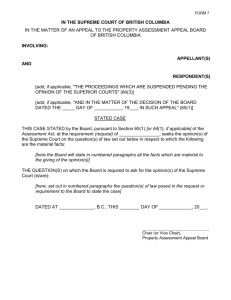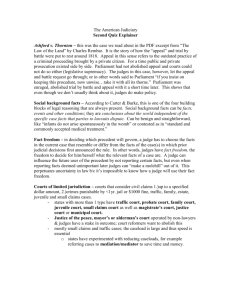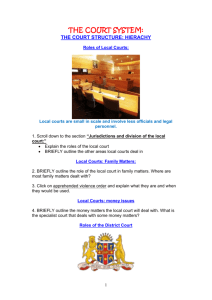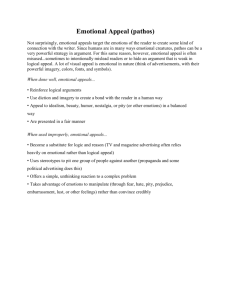Court of Appeal - Citizens Information Board
advertisement
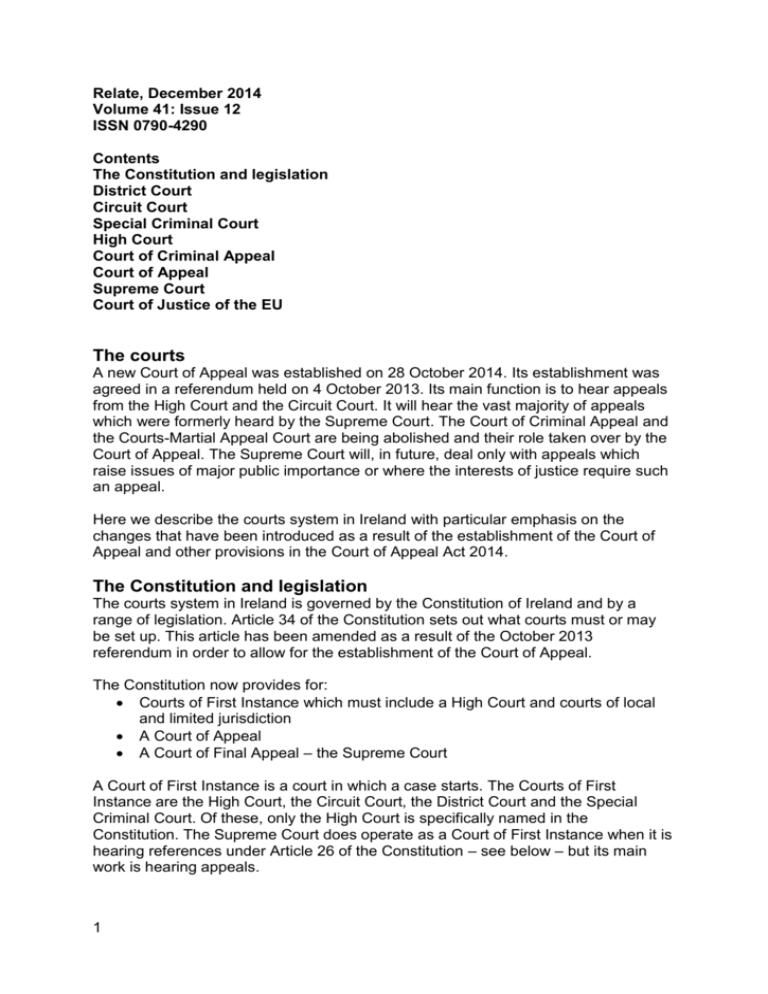
Relate, December 2014 Volume 41: Issue 12 ISSN 0790-4290 Contents The Constitution and legislation District Court Circuit Court Special Criminal Court High Court Court of Criminal Appeal Court of Appeal Supreme Court Court of Justice of the EU The courts A new Court of Appeal was established on 28 October 2014. Its establishment was agreed in a referendum held on 4 October 2013. Its main function is to hear appeals from the High Court and the Circuit Court. It will hear the vast majority of appeals which were formerly heard by the Supreme Court. The Court of Criminal Appeal and the Courts-Martial Appeal Court are being abolished and their role taken over by the Court of Appeal. The Supreme Court will, in future, deal only with appeals which raise issues of major public importance or where the interests of justice require such an appeal. Here we describe the courts system in Ireland with particular emphasis on the changes that have been introduced as a result of the establishment of the Court of Appeal and other provisions in the Court of Appeal Act 2014. The Constitution and legislation The courts system in Ireland is governed by the Constitution of Ireland and by a range of legislation. Article 34 of the Constitution sets out what courts must or may be set up. This article has been amended as a result of the October 2013 referendum in order to allow for the establishment of the Court of Appeal. The Constitution now provides for: Courts of First Instance which must include a High Court and courts of local and limited jurisdiction A Court of Appeal A Court of Final Appeal – the Supreme Court A Court of First Instance is a court in which a case starts. The Courts of First Instance are the High Court, the Circuit Court, the District Court and the Special Criminal Court. Of these, only the High Court is specifically named in the Constitution. The Supreme Court does operate as a Court of First Instance when it is hearing references under Article 26 of the Constitution – see below – but its main work is hearing appeals. 1 Some of the Courts of First Instance also hear appeals from lower courts and/or from other public bodies. The Court of Appeal deals only with appeals. The High Court, the Court of Appeal and the Supreme Court are sometimes described in legislation and in practice as the “superior courts” and the other courts are the “lower courts”. Courts which are hearing appeals are sometimes described as being “appellate courts” or as exercising their “appellate jurisdiction”. Article 35 of the Constitution deals with the appointment of judges, their independence and their removal from office for stated misbehaviour or incapacity. Legislation sets out much of the detail of what types of cases each court hears and how the courts operate. The numbers of judges, their pay and conditions and the role of various officers of the courts are also set out in legislation. The main pieces of legislation are the Courts (Establishment and Constitution) Act 1961 and the Courts (Supplemental Provisions) Act 1961. These have been amended on many occasions. The most recent legislation is the Court of Appeal Act 2014, most of which came into effect on 28 October 2014. The details of how cases are conducted in the courts are the various rules of the courts, for example, the District Court Rules. These rules are contained in statutory instruments which are frequently amended. Practice directions are sometimes issued by the Presidents of the courts. The Court of Appeal Act 2014 gives statutory powers to the Chief Justice and the President of the Court of Appeal to actively manage the cases before their courts and to issue practice directions in relation to applications to their courts and to appeals before their courts. These directions must be in the interests of the administration of justice and the determination of proceedings in a manner which is just, expeditious, and likely to minimise the cost of those proceedings. The text of the Constitution, including the amendments relating to the establishment of the Court of Appeal, and all the legislation including statutory instruments, are available at irishstatutebook.ie. The rules of court and practice directions are available at courts.ie. Judges The Constitution provides that judges are independent in the exercise of their functions and are subject only to the Constitution and the law. They are appointed by the President of Ireland on the nomination of the Government. All judges must be practising solicitors or barristers with at least ten years’ experience in the case of the District and Circuit Courts, and 12 years’ experience for appointment to the Superior Courts. The Judicial Appointments Advisory Board receives applications and makes recommendations about appointments as judges but the Government is not bound by these recommendations. Website: jaab.ie The pay and conditions of judges are set by legislation. The Court of Appeal Act 2014 provides for, among other things, the pay and pensions of judges of that court. 2 Each judge is a designated judge of a particular court. However, Superior Court judges may temporarily sit as judges of any other of the Superior Courts if there are not enough designated judges available in that court. So, for example, judges of the Supreme Court and the High Court may sit on the Court of Appeal if there are not enough designated Court of Appeal judges available to deal with the cases. Judges of the High Court may be appointed to serve on various bodies (for example, the Standards in Public Office Commission) or to conduct investigations into various issues (for example, into the conduct of designated officers of the Garda Síochána Ombudsman Commission). In general, the Court of Appeal Act 2014 provides that judges of the Court of Appeal may also be appointed to carry out these functions. The Taxing Master The role of the Taxing Master is to “tax” costs in cases heard in the Superior Courts (High Court, Court of Appeal and Supreme Court). This has nothing to do with tax in its normal meaning. If you have been involved in legal proceedings and you have to pay the costs involved, you may apply to the Taxing Master to have the costs taxed. This means that the Taxing Master will examine the costs to see if they are fair and reasonable for the work involved. The County Registrar may deal with the taxation of costs incurred in Circuit Court cases. The Courts Service The Courts Service is responsible for the management and administration of the courts. Its main functions are to: Manage the courts Provide support services for judges Provide information on the courts system to the public Provide, manage and maintain court buildings Provide facilities for users of the courts The Courts Service website, courts.ie, provides information about the different courts, information about fees, forms to be used, the rules of court, the lists of cases for hearing before the Superior Courts and the Circuit Court (lists of District Court cases are available from the District Court offices), and written judgments issued by the Superior Courts (judgments in the District and Circuit Courts are almost always oral). It also provides information about family law and the various procedures involved. District Court The District Court is organised on a local basis. It deals with both civil and criminal cases. Current legislation allows for the appointment of a President of the District Court and 63 ordinary judges. The District Court is called the Children Court when it is dealing with certain cases involving children, for example, when a child is being charged with an offence. Civil cases The District Court deals with a range of civil cases. These include civil cases for damages where the compensation being sought is not more than €15,000. 3 It also deals with family law cases, for example, custody of children, maintenance of spouses and children (up to a limit of €500 a week for a spouse and €150 a week for a child), barring orders, child care orders and associated applications; and a range of other matters including liquor licencing, control of dogs and orders in relation to noise. The Small Claims procedure is available in the District Court. This provides for small claims of up to €2,000 to be dealt with by the Small Claims Registrar who is the District Court Clerk and, if this fails to bring about a resolution, by the judge. The European Small Claims Procedure applies in cross-border cases and operates in a similar manner. Criminal cases The District Court deals with minor criminal offences, for example, speeding and other road traffic offences, minor assaults and minor public order offences. These are offences for which there is no right to trial by jury. In certain cases, it may also deal with offences where there is a right to a jury trial but the prosecution, the person charged and the judge all agree that it may be tried in the District Court. It also deals with the preliminary stages of more serious cases before those cases are heard by the Circuit Criminal Court or the Central Criminal Court. Who decides A judge of the District Court, sitting alone, makes all the decisions. There is no jury. Appeals from decisions of the District Court You may appeal to the Circuit Court against a decision of the District Court in nearly all civil and criminal cases. You may appeal to the High Court against a decision of the District Court to refuse bail or you may ask the High Court to change the conditions of your bail. The District Court judge may ask the High Court for a ruling on a point of law. Circuit Court The Circuit Court is organised on a regional basis with the country being divided into eight circuits. It deals with both civil and criminal cases. When dealing with criminal cases, it is called the Circuit Criminal Court. Current legislation allows for the appointment of a President of the Circuit Court, up to 37 ordinary judges of the Circuit Court and up to eight specialist judges. The President of the District Court is an additional judge of the Circuit Court. Civil cases The Circuit Court deals with a range of civil cases. These include claims for damages where the compensation being sought is not more than €75,000 or €60,000 in personal injury cases or where the rateable valuation of land involved is not more than €253.95. (If the parties agree, the Circuit Court can have unlimited jurisdiction.) It also deals with family law cases, for example, those involving judicial separation and divorce, certain property matters and with a number of other matters. There are 4 currently six specialist Circuit Court judges who deal with personal insolvency cases – see Relate, February 2013. Criminal cases The Circuit Criminal Court deals with all serious criminal offences other than those which are dealt with by the Central Criminal Court or the Special Criminal Court. Who decides A judge of the Circuit Criminal Court hearing criminal cases sits with a jury. The judge makes any decisions about the law, for example, whether evidence is admissible, and the jury decide whether or not the accused is guilty. In civil cases, the judge of the Circuit Court sits alone and makes all the decisions. Appeals from decisions of the Circuit Court You may appeal to the High Court against a decision of the Circuit Court in civil cases. Appeals from decisions of the Circuit Criminal Court may be brought in the Court of Appeal (before 28 October 2014, they were brought in the Court of Criminal Appeal). A judge of the Circuit Court may state a case to the Court of Appeal. “Stating a case” means that the judge of the Circuit Court outlines a particular legal issue to the Court of Appeal and asks the Court of Appeal to make a ruling on it. Before 28 October 2014, such cases were stated to the Supreme Court. Appeals to the Circuit Court The Circuit Court hears appeals from decisions of the District Court and a range of statutory bodies, for example, the Labour Court, the Employment Appeals Tribunal, the Data Protection Commissioner and the Tax Appeal Commissioners. In general, the decision of the Circuit Court in these cases is final but, in some cases, there may be an appeal on a point of law to the High Court. An appeal on a point of law means that the High Court is asked to outline what the law is on a particular issue; the case itself is not reheard in the High Court. If the High Court rules that the judge of the Circuit Court was wrong on the point of law, the case is usually sent back to the Circuit Court to have the correct law applied and a decision made by the Circuit Court judge. Special Criminal Court The present Special Criminal Court was established in 1972 under the Offences Against the State Act 1939. It deals with offences which are scheduled under that Act. These are mainly offences of a subversive nature and firearms offences. The Director of Public Prosecutions (DPP) has the power to order that any offence may be tried by the Special Criminal Court where he or she is satisfied that the ordinary courts are "inadequate to secure the effective administration of justice and the preservation of public peace and order". Who decides Three judges sit on the Special Criminal Court – one each from the High Court, the Circuit Court and the District Court. There is no jury. Appeals 5 Decisions of the Special Criminal Court may be appealed to the Court of Appeal (before 28 October 2014, such appeals were made to the Court of Criminal Appeal). High Court The High Court is described in the Constitution as having “full original jurisdiction in and power to determine all matters and questions whether of law or fact, civil or criminal”. It is called the Central Criminal Court when dealing with criminal cases. Current legislation allows for the appointment of a President of the High Court and 36 ordinary judges. The Presidents of the Circuit Court and the Court of Appeal as well as the Chief Justice are additional judges of the High Court. Civil cases The High Court deals with a wide range of civil cases. These include civil claims for damages where the compensation being sought is more than €75,000 (or €60,000 in personal injury cases) as well as property disputes, challenges to decisions of public bodies (usually called judicial review), appeals from decisions of certain public bodies, family law cases, company law and bankruptcy matters. Challenges to the constitutionality of laws may be brought only in the High Court (and, on appeal, to the Court of Appeal and/or the Supreme Court). The High Court also deals with a range of other matters and with appeals from decisions of the Circuit Court. Criminal cases The Central Criminal Court deals with charges of murder, rape and aggravated sexual assault. It has jurisdiction to deal with crimes such as treason, piracy and genocide but these almost never arise. It also has jurisdiction to deal with criminal trials under the Competition Acts but these are very rare. Most cases in the High Court are heard within one to five months. However, there are greater delays in some areas, for example, there is a two-year waiting time for asylum cases and a 17-month wait in the Central Criminal Court. Who decides A judge of the High Court sitting alone usually decides in civil cases although the judge may sit with a jury in certain types of civil claims, for example, in certain defamation cases. In some cases of exceptional importance, the President of the High Court may decide that three High Court judges should sit together to decide. In the Central Criminal Court, a judge of the High Court sits with a jury. As in the Circuit Criminal Court, the judge decides on legal issues and the jury makes the decision on guilt. Appeals from decisions of the High Court Generally, appeals from decisions in civil and criminal cases may be brought to the Court of Appeal although in some particular cases the right of appeal is limited by legislation. (Before 28 October 2014, appeals in criminal cases were to the Court of Criminal Appeal). There is no appeal to the Court of Appeal from decisions of the High Court on appeals from the Circuit Court. Appeals may be made directly to the Supreme Court if specific conditions are fulfilled – see below. Appeals to the High Court 6 As described above, you may appeal to the High Court against decisions of the Circuit Court in civil cases. Court of Criminal Appeal The Court of Criminal Appeal is not mentioned in the Constitution. It was established by legislation. (The Courts and Court Officers Act 1995 provided for the abolition of the Court of Criminal Appeal and the transfer of its functions to the Supreme Court. This was never brought into effect.) Until the establishment of the Court of Appeal, decisions of the Circuit Criminal Court, the Special Criminal Court and the Central Criminal Court (the High Court) could be appealed to the Court of Criminal Appeal. There was a limited right of appeal from the Court of Criminal Appeal to the Supreme Court. Decisions of the Court of Criminal Appeal could be appealed to the Supreme Court only: If the appeal raised a point of law of exceptional public importance and It was in the public interest that the appeal be allowed to proceed In practice, there were relatively few appeals from the Court of Criminal Appeal to the Supreme Court. Who decides One judge of the Supreme Court and two judges of the High Court sat on the Court of Criminal Appeal. Abolition of the Court of Criminal Appeal The Court of Criminal Appeal is being abolished. In general, it will deal with cases which were started before 28 October 2014 and were heard in full or in part before that date. There are 26 such appeals. The Court of Criminal Appeal will cease to exist when these cases are decided. Other outstanding appeals and appeals arising after 28 October 2014 will be heard by the new Court of Appeal. When the Court of Appeal was established, there were 142 sentence appeals, 75 appeals from conviction, and 346 uncertified appeals waiting for hearing. These will be heard by the Court of Appeal. Court of Appeal A referendum was held on 4 October 2013 to allow for the establishment of the Court of Appeal (and the abolition of the “one-judgment” rule in certain cases – see below). The referendum was passed. The amendments to the Constitution are contained in the Thirty-third Amendment of the Constitution (Court of Appeal) Act 2013. Some of the changes to the Constitution are temporary. Those dealing with how the Court of Appeal is to be established (Article 34A) will not appear in the published version of the Constitution after 28 October 2014 and those dealing with the arrangements for cases which were awaiting hearing in the Supreme Court (Article 64) will not be published after 28 October 2015. The resulting amendment to the Constitution required the Oireachtas to pass a law establishing the Court of Appeal. This law, the Court of Appeal Act 2014, establishes the Court of Appeal and also deals with a number of other issues relating to the courts. The detail of how the Court of Appeal Act 2014 operates is set out in the Rules of the Superior Courts (Court of Appeal Act 2014) 2014 (SI 485/2014). 7 The Act includes a provision that gives the power to introduce regulations to deal with unexpected difficulties which might arise. This power will remain in existence for two years. The amendment to the Constitution also includes provisions relating to how appeals which were before the Supreme Court on the day the Court of Appeal was established were to be dealt with. The Court of Appeal was actually established on 28 October 2014. The Court of Appeal has a President and up to nine judges. The Chief Justice and the President of the High Court are additional judges of the Court of Appeal. The President of the Court of Appeal distributes and allocates the work of the court. Civil and criminal cases As with the other Superior Courts, some of the jurisdiction of the Court of Appeal is conferred by the Constitution and some by the legislation. It now has jurisdiction to hear appeals from decisions of the High Court, the Circuit Criminal Court, the Special Criminal Court, the Central Criminal Court and Courts-Martial. As stated above, the legislation limits the right of appeal in some cases. Cases stated by the Circuit Court will be dealt with in the Court of Appeal rather than the Supreme Court. Questions of law which are referred by the Director of Public Prosecutions (DPP) in cases where the person charged has been acquitted will be heard in the Court of Appeal rather than the Supreme Court. The decision of the Court of Appeal does not affect the acquittal verdict in these cases. Appeals by the DPP against an acquittal or against a decision not to order a retrial will also be heard by the Court of Appeal rather than the Supreme Court. The Court of Appeal will hear appeals from cases heard in the High Court about whether or not a law is constitutional. The Constitution provides that no laws may be passed restricting the Court of Appeal’s jurisdiction to do this. Courts-Martial Courts-Martial are military courts. They are provided for in Article 38 of the Constitution and their procedures are now governed by the Defence (Amendment) Act 2007. They deal with offences against military law by members of the Defence Forces. In general, they are presided over by military judges but judges of the Circuit Court may be designated to perform the functions of a military judge. Further information on the Irish court-martial system is available at military.ie. The Courts-Martial Appeal Court heard appeals from people who had been convicted by a court-martial. The court was composed in the same way as the Court of Criminal Appeal (that is, a Supreme Court judge and two High Court judges). The Court of Appeal is taking over the functions of the Courts-Martial Appeal Court but transitional arrangements have been made for cases which were before the CourtsMartial Appeal Court on 28 October 2014. Appeals waiting to be heard 8 The amendment to the Constitution provides that the Chief Justice has the power to issue directions about which of the appeals that were before the Supreme Court on the day the Court of Appeal was established may be heard by the Court of Appeal. On 29 October 2014, the Chief Justice issued a direction setting out the class of appeals pending in the Supreme Court which are to be transferred to the Court of Appeal. This direction means that 327 appeals which are ready for hearing will be heard by the Supreme Court and 258 such appeals have been transferred to the Court of Appeal. Before the establishment of the Court of Appeal, waiting times in the Supreme Court were 48 months for most cases and 11 months for those cases which had been granted priority. There were about 570 cases before the Court of Criminal Appeal when the Court of Appeal was established. The new Court of Appeal is currently dealing mainly with these cases. Expedited appeals The Rules of the Superior Courts determine, to some extent, the priority given to the various appeals before it. The rules make provision for expedited appeals. These include appeals in relation to: Issues which affect personal liberty, for example, habeas corpus applications European arrest warrants Child abduction Interlocutory orders Summary judgments Commercial transactions such as examinerships, appointments of receivers and liquidators Bankruptcy and personal insolvency decisions Decisions on the capacity of a person, including in Ward of Court cases Who decides The Court of Appeal may sit in divisions of three judges. A number of divisions have been sitting simultaneously since 29 October 2014. Some interlocutory and procedural applications may be heard by the President alone or by another judge nominated by the President. Interlocutory applications are applications for a temporary decision to deal with issues that will be finally decided when the case is fully heard. For example, an interlocutory application may be made to prevent the removal of assets until a final decision is made on who is entitled to receive the assets. Procedural applications could include, for example, an application for legal aid. In criminal cases (unless there is a constitutional issue involved), the legislation requires the Court of Appeal to give one judgment; the existence of a dissenting opinion will not be made public. This has been the practice in the Court of Criminal Appeal. The “one judgment” rule One of the proposals in the referendum of 4 October 2013 concerned what is known as the “one judgment” rule. This involved deleting Article 34.4.5° of the Constitution. This provided that there would be only one judgment given in cases involving the 9 constitutionality of an Act of the Oireachtas. This article was deleted on 28 October 2014. This means that each sitting judge of the Court of Appeal (and the Supreme Court) may issue a judgment in these cases. Supreme Court The Supreme Court is the highest domestic court. It deals mainly with appeals from other courts. The Supreme Court is composed of the Chief Justice and up to nine ordinary judges. The Presidents of the Court of Appeal and the High Court are additional judges of the Supreme Court. Civil and criminal cases Before 28 October 2014, the Supreme Court heard appeals against decisions of the High Court. It also heard some appeals from the Court of Criminal Appeal. Appeals from the Court of Criminal Appeal to the Supreme Court remain with the Supreme Court. The Constitution now provides that, subject to such regulations as may be prescribed by law, the Supreme Court has jurisdiction to hear: 1. Appeals from the Court of Appeal if the Supreme Court is satisfied that: The decision involves a matter of general public importance or In the interests of justice it is necessary that there be an appeal to the Supreme Court 2. Direct appeals from the High Court if the Supreme Court is satisfied that there are exceptional circumstances warranting a direct appeal to it. In order for the Supreme Court to be satisfied, either or both of the following factors must be present: The decision involves a matter of general public importance The interests of justice In effect, the Supreme Court itself decides what appeals it will hear. If the Supreme Court decides to hear an appeal directly from the High Court, then there is no right of appeal to the Court of Appeal. References under Article 26 Article 26 provides that the President of Ireland may refer certain Bills which have been passed by the Houses of the Oireachtas to the Supreme Court for a decision as to whether the Bill as a whole or certain provisions of it are constitutional. This has not been changed by the establishment of the Court of Appeal. The Constitution requires that at least five Supreme Court judges sit to hear any such referral. They must give their judgment within 60 days. The judgment must be given by one judge (the “one judgment rule”) and the existence or otherwise of dissenting opinions is not made known. The “one judgment” rule in these cases has not been changed. Who decides 10 The Constitution requires that certain decisions of the Supreme Court must be made by not less than five judges. These are: Decisions on references by the President under Article 26 of the Constitution Decisions on the permanent incapacity of the President (such a decision has never arisen) The law provides that Supreme Court decisions on whether an Act of the Oireachtas or a part of it is constitutional must be made by not less than five judges. In all other cases, the law provides that the Supreme Court may sit in divisions. In practice, the Supreme Court usually sits in divisions of three or five but in exceptional cases seven judges may sit together. For example, seven judges made the recent decision on surrogacy (M.R. and Others v An tArd-Chláraitheoir and Others; judgment of 7 November 2014). Website: courts.ie). The Chief Justice or a Supreme Court judge may sit alone to hear certain interlocutory and procedural applications. The Court of Appeal Act 2014 provides that the Supreme Court does not have to hold an oral hearing in certain cases. These include cases where a person is applying to the Supreme Court for leave to appeal a decision of the Court of Appeal or the High Court. All decisions will be publicly available and the reasons for the decision must be given. Court of Justice of the EU If a question of the interpretation of EU law arises in any of the domestic courts or in certain quasi-judicial bodies, it may be referred (and, in some cases, must be referred) to the Court of Justice of the EU (also known as the European Court of Justice). The European Commission or a member state may bring cases to the Court of Justice against individual member states for failure to uphold EU law. The ruling of the Court of Justice is binding on Irish courts. Who decides The Court of Justice is composed of a judge from each member state of the EU. A number of judges may sit to hear each case – usually three or five. Website: curia.europa.eu 11



